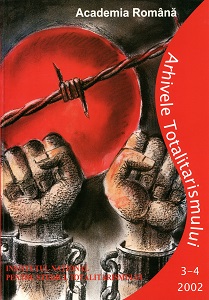Desovietizarea culturii românești la începutul deceniului șapte, I
The desovietization of Romanian culture in the early seventh decade, I
Author(s): Mihaela Cristina VerzeaSubject(s): Cultural history, Political history, Post-War period (1950 - 1989), History of Communism, Source Material
Published by: Institutul National pentru Studiul Totalitarismului
Keywords: Romania; culture; 70s; desovietization; communism; cultural policy;
Summary/Abstract: After March 6, 1945, Sovietization spread from the socio-political and economic sector to the cultural one as well. The newly created institutional framework included: the Romanian Association for Closer Ties with the Soviet Union (ARLUS), the “Russian Book” publishing house and bookstore (1946), the Institute of Romanian-Soviet Studies (1947), the Romanian-Russian Museum (1948) and the “Maxim Gorki” Russian Language Institute (1948). In the early seventh decade, a distancing from the Soviet Union determined a review of the relations with the big neighbour in the East. The text reproduces two documents about the desovietization process in Romania. Interesting aspects are revealed about the closing of two institutions that had played a major role in the Sovietization of Romanian culture. The formula the communist elite adopted was very artful, i.e. it specified not the uselessness of certain bodies but the overlapping of their activity with that of other similar institutions.
Journal: Arhivele Totalitarismului
- Issue Year: X/2002
- Issue No: 3-4
- Page Range: 167-171
- Page Count: 5
- Language: Romanian
- Content File-PDF

